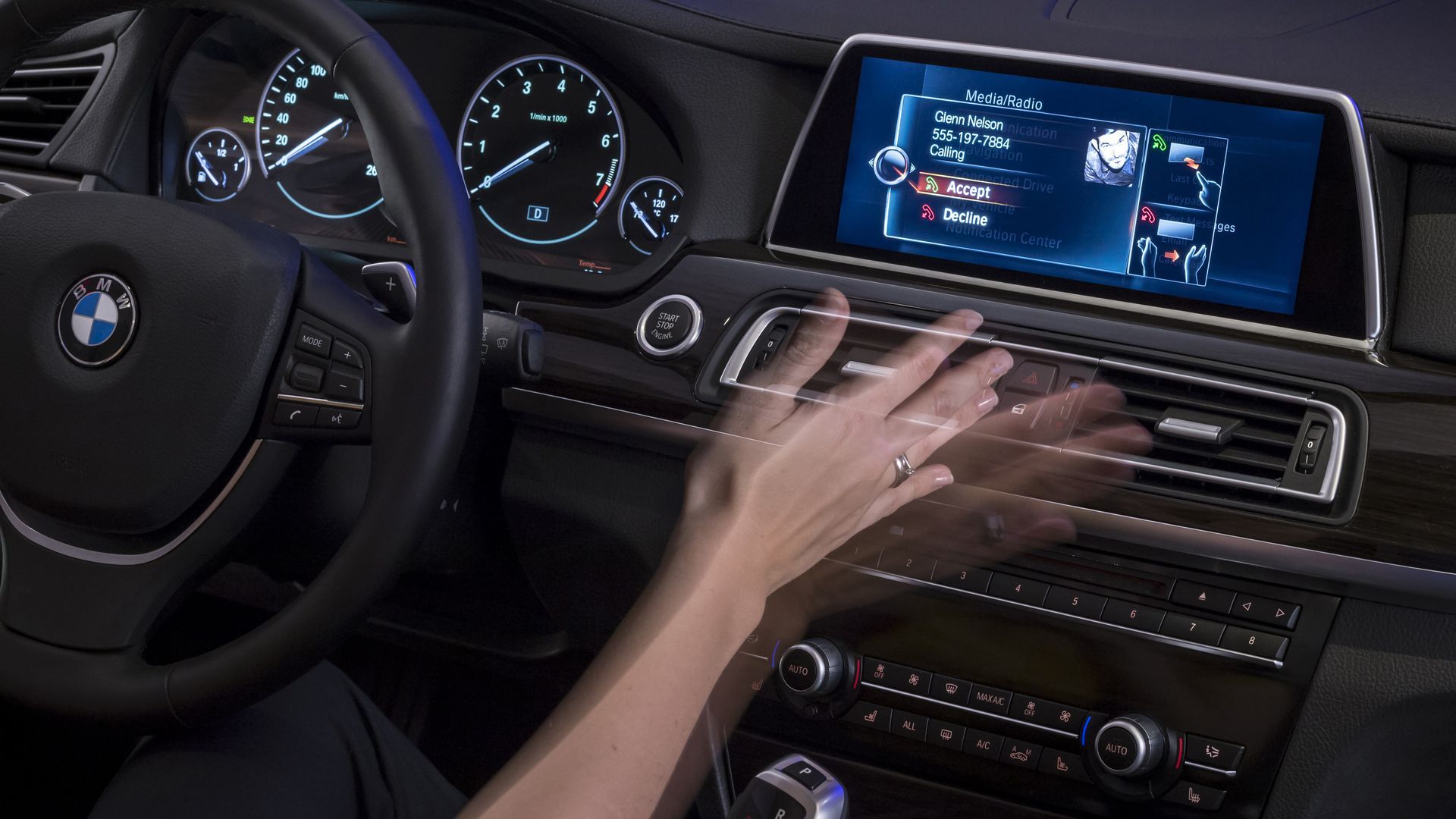| | | | | | | Presented By Google Cloud | | | | Axios What's Next | | By Jennifer A. Kingson, Joann Muller and Erica Pandey ·Oct 14, 2021 | | Pop quiz: How many of the advanced features in your car do you know how to use? Yes, well, you're not alone, as Joann Muller reports. - Today's What's Next photo is a glance at California's drought, which officials there are calling historic.
- We want your photos, too! Please send a picture that tells a story of how we live, work, get around or play to whatsnext@axios.com.
Today's Smart Brevity count: 1,212 words ... 4½ minutes. | | | | | | 1 big thing: Car owners pay dearly for tech they don't use |  | | | BMW's gesture control technology is hard to master for many drivers, who say they just don't need it. Photo: BMW | | | | Technology can be a big seller in new cars, but it turns out that many digital features go unused — assuming owners even know their car has them, Joann writes. Why it matters: High-tech features are driving up vehicle prices. But if consumers don't use them — or are frustrated because the stuff doesn't work properly — then both automakers and car buyers are wasting their money. Driving the news: For more than 1 in 3 advanced technologies, most owners didn't even use the feature during the first three months of ownership, a J.D. Power tech study found. - Usually, owners say it's because they don't need the feature, but sometimes it's because they don't know about it or find it difficult to use.
BMW's gesture control technology is a great example. It's supposed to let you wiggle a finger or wave your hand to perform tasks like adjusting the radio volume or answering a call — as opposed to touching a screen or button. - But the tech had the lowest overall satisfaction score in J.D. Power's annual U.S. Tech Experience Index for the second year in a row.
- My thought bubble: I drove a BMW X6 last year that had gesture control as part of a $2,300 Premium package. I concur with BMW owners. It was easier to just use the buttons.
Digital marketplace: Technology like General Motors' Marketplace lets you order food, make reservations and find gas stations from your dashboard. - But 61% of owners say they've never used their car's digital marketplace, and 51% said they don't need it.
Driver/passenger communications: These systems from carmakers like Honda, Hyundai and Toyota let drivers talk more easily with rear-seat occupants via a microphone or camera. - 52% say they've never used the system, and 40% say they don't need it. (Who needs a mic when you can just turn around and yell at your kids?)
Between the lines: Consumers are more likely to use emerging technology if the car dealer does a good job of demonstrating how it works, J.D. Power found. - But a lot of car salespeople aren't fully trained to explain all the features of the cars they sell — and often buyers don't ask, aren't interested or can't take it all in.
- Some dealers encourage buyers to schedule a follow-up visit to the dealership for a refresher.
- When a buyer does get a lesson from their dealer about how to use an advanced feature, they use it more, the study found.
What car owners love: cameras, cameras and more cameras. - The top-rated technologies all provide an extra set of eyes: backup cameras with trajectory guidance, rear-view mirror cameras that enhance visibility, and 360-degree ground view cameras.
The bottom line: In-car technology has to be simple to use — and well explained to the driver ahead of time — or it's not worth the money. Read the full story. |     | | | | | | 2. The staggering ubiquity of iPhones |  | | | Illustration: Aïda Amer/Axios | | | | A whopping 87% of U.S. teenagers have iPhones, per a new survey of 10,000 young people from investment bank Piper Sandler, Erica Pandey writes. Why it matters: The economy is going mobile as the next generation of consumers shops for clothes, watches TV and meets romantic partners almost exclusively on their phones. What's happening: Not only are today's teens more tech-forward, their priorities and spending habits also deviate from their millennial predecessors — and their likes and dislikes tell us which brands will thrive in the future. - They care about sustainability: 51% of teens have purchased secondhand items and 62% have sold things they own, per the survey.
- 14% of teens consume plant-based meat, with the fake meat giants Impossible Foods and Beyond Meat taking the bulk of the market share.
- They spend money on looks: Clothing (22%) has eclipsed food (21%) as the category teens spend the most on.
- And the share of young people who wear makeup every day is on the rise — from 22% last fall to 33% now.
- They like watching and sharing videos: The most popular social media apps among teens all lean on video. 35% say Snapchat is their favorite app, 30% say TikTok, and 22% say Instagram.
- They're bringing back some old styles: Crocs are (somehow) gaining popularity among teens.
The bottom line: We're watching how a new crop of consumers — raised on the internet and passionate about social justice — are changing the economy. Methodology: The survey was conducted Aug. 17–Sept. 16. 10,000 teens were surveyed in 44 states with an average household income of $67,755. Share this story. |     | | | | | | 3. Groups launch "How to Stop Facebook" effort |  | | | Illustration: Megan Robinson/Axios | | | | A coalition of nonprofits on Wednesday debuted the campaign HowToStopFacebook.org, a fresh push to encourage greater government regulation of the social networking giant aimed at forcing the company to change its business model, Ina Fried writes for Axios Login. Why it matters: The campaign hopes to take the outrage expressed by legislators over the revelations of whistleblower Frances Haugen and translate it into action. The campaign is pushing for two goals: - A congressional investigation with subpoena power into harms caused by Facebook.
- A strong federal data privacy law that makes it illegal for companies like Facebook and YouTube to collect the vast amounts of data they use to personalize recommendations.
Read the full story. |     | | | | | | A message from Google Cloud | | Looking for your next cloud insights? Join Google Cloud Next | | |  | | | | Join Next '21 to experience live Q&As with leading experts and hands-on demos with the latest Google Cloud tech. This no-cost digital event lets you explore new possibilities, get informed, be inspired, and expand your expertise. Register now. | | | | | | 4. Astronomy's 10-year plan |  | | | Illustration: Sarah Grillo/Axios | | | | Astronomers are awaiting the release of a series of proposals and recommendations that will guide the field for the next decade, Miriam Kramer reports in Axios Space. Why it matters: Astronomy is at a transitional moment. Large ground and space-based telescopes are nearing completion, and the field is reckoning with sexism, racism and harassment — all issues that shape the science at least as much as new technologies and missions. - The document — called the decadal survey — won't just make recommendations about the next missions NASA and others should fund, it's also expected to address the inequality that's plagued and hindered the field.
- "I'm proud and happy that our community is acknowledging that science is, you know, a human endeavor," astronomer Grant Tremblay told Axios.
How it works: The decadal survey, expected by year-end, is expected to have three major pillars. - One will focus on recommendations for space-based telescopes and missions, including at least one new, expensive flagship mission to follow the James Webb Space Telescope and the Roman Space Telescope.
- A second pillar will focus on ground-based astronomy. It may include a recommendation on the future of the controversial Thirty Meter Telescope in Hawaii, which many native Hawaiians have protested for a number of years.
- The third pillar will look at the state of the profession itself, examining what it will take to make astronomy more equitable and providing recommendations for how to make that happen.
Share this story. |     | | | | | | 5. Photo of the day |  | | | Houseboats in California's Lake Oroville this month. Photo: David Paul Morris/Bloomberg via Getty Images | | | | What's Next: More calls for Californians to conserve water This photo, taken on Monday, shows the perilous situation of houseboats docked in Northern California's Lake Oroville, roughly 70 miles north of Sacramento and 140 miles west of Reno. "This drought has strained water resources like never before," per the Sacramento Bee. "Several of the state's largest reservoirs are already at record lows. The water level is so low in Lake Oroville that officials had to shutter a hydroelectric power plant for the first time ever." In July, California Gov. Gavin Newsom asked Californians to conserve water by 15%, but after three weeks they only hit the 1.8% mark. |     | | | | | | A message from Google Cloud | | Explore what's now and what's next at Google Cloud Next | | |  | | | | From live Q&As with experts to hands-on demos and real-world applications of the latest Google Cloud tech, explore the possibilities at Next '21. Get informed, be inspired and expand your expertise. Register now to build a customized experience. | | | | Thanks for reading! If this email was forwarded to you, feel free sign up for Axios What's Next here. |  | | It'll help you deliver employee communications more effectively. | | | | | | Axios thanks our partners for supporting our newsletters. If you're interested in advertising, learn more here.
Sponsorship has no influence on editorial content. Axios, 3100 Clarendon Blvd, Suite 1300, Arlington VA 22201 | | | You received this email because you signed up for newsletters from Axios.
Change your preferences or unsubscribe here. | | | Was this email forwarded to you?
Sign up now to get Axios in your inbox. | | | | Follow Axios on social media:    | | | | | |










No comments:
Post a Comment